Why Cortisol Balance Matters for Emotional Strength
Introduction
Cortisol is often called the “stress hormone,” but that nickname only tells half the story. While cortisol does play a role in your body’s “fight-or-flight” response, it’s also crucial for energy, focus, motivation, and resilience. When cortisol levels are balanced, you can handle life’s ups and downs with emotional stability and clarity. When they’re not, even small stressors can feel overwhelming.
This article explores why cortisol balance is essential for emotional strength, how chronic stress disrupts it, and what you can do — through nutrition, supplements, breathwork, and therapy — to restore calm to your mind and body.
Looking for supplements for Emotional Resilience? Click here.
🧠 What Is Cortisol and Why Does It Matter?
Cortisol is a steroid hormone produced by your adrenal glands, small organs sitting on top of your kidneys. It helps regulate:
Energy metabolism ⚡
Blood pressure 🩸
Immune response 🛡️
Sleep-wake cycle 🌙
Mood and motivation 💭
When you wake up in the morning, cortisol rises to help you feel alert. Throughout the day, it gradually decreases, hitting its lowest point at night to allow for restful sleep.
But in a world full of deadlines, financial stress, relationship challenges, and constant notifications, your brain often keeps cortisol elevated for too long. That’s where problems begin.
⚖️ The Link Between Cortisol and Emotional Regulation
Balanced cortisol supports the prefrontal cortex — the rational part of your brain responsible for decision-making and impulse control. When stress hormones surge, activity shifts toward the amygdala, your emotional alarm center.
Over time, this shift makes you:
More reactive 😤
Less patient 😩
Emotionally drained 😞
Prone to anxiety or sadness 😰
A chronic imbalance can even shrink the hippocampus, a brain region essential for memory and emotional processing. This helps explain why burnout often feels like mental fog plus emotional instability.
Signs Your Cortisol Might Be Imbalanced
Trouble falling asleep or waking up tired 😴
Irritability or mood swings 😡😢
Salt or sugar cravings 🍫
Frequent colds or slow recovery from illness 🤧
Weight gain around the belly area ⚖️
Feeling “wired but tired” in the evenings 🌙
If you recognize several of these, your body might be in a state of chronic stress overload.
🌪️ How Chronic Stress Depletes Emotional Strength
When your body is under prolonged stress, it diverts resources away from non-essential systems — like digestion, reproductive function, and emotional regulation — to keep you in survival mode.
The Emotional Toll
Reduced serotonin and dopamine production
→ You feel less joy, motivation, and pleasure.
Increased inflammation
→ Inflammation affects neurotransmitters, leading to irritability and fatigue.
Sleep disruption
→ Poor sleep raises cortisol further, creating a vicious cycle.
Nervous system dysregulation
→ The “fight-or-flight” mode stays stuck in the ON position.
This is why balanced cortisol isn’t just about stress relief — it’s about emotional resilience: the ability to stay centered even when life gets chaotic.
🌞 Cortisol and the Circadian Rhythm

Your body’s cortisol rhythm (called the diurnal pattern) is tightly linked with your circadian clock.
Morning: High cortisol boosts alertness and readiness.
Afternoon: It gradually declines to promote steady energy.
Evening: It drops, preparing you for rest.
If you often feel tired in the morning but wired at night, your rhythm may be inverted. This misalignment can lead to emotional instability and fatigue because your body’s recovery mechanisms are off track.
🕰️ Ways to Reset Your Cortisol Rhythm
Get morning sunlight exposure (10–20 minutes). ☀️
Avoid bright screens 1–2 hours before bed. 📱
Eat breakfast with protein to stabilize blood sugar. 🍳
Keep a consistent sleep schedule, even on weekends. 😴
🍎 Nutrition for Cortisol Balance
Your diet directly affects how your body produces and metabolizes cortisol. Blood-sugar swings, nutrient deficiencies, and caffeine overload all increase stress on the adrenal system.
Eat for Steady Energy
Protein in every meal (e.g., eggs, fish, tofu) to stabilize glucose.
Complex carbs (like oats, quinoa, or sweet potatoes) to reduce cortisol spikes.
Healthy fats (avocado, olive oil, nuts) for hormone synthesis.
Leafy greens and magnesium-rich foods (spinach, pumpkin seeds) to calm the nervous system.
Limit
Excess caffeine ☕ (raises cortisol).
Refined sugar 🍩 (causes insulin spikes).
Alcohol 🍷 (disrupts sleep and hormonal repair).
Eating regularly — every 3–4 hours — helps prevent hypoglycemia, a hidden stressor that can trigger cortisol surges and mood dips.
💊 Supplements That Support Cortisol Balance
Certain nutrients and herbal adaptogens can help regulate cortisol naturally. While they’re not substitutes for stress management, they can provide valuable support.
Ashwagandha 🌿
A well-known adaptogen that lowers cortisol and improves stress resilience. Studies show it can reduce anxiety and fatigue while boosting focus.
Rhodiola Rosea 🏔️
Helps balance energy and mood under chronic stress. Ideal for people who feel mentally exhausted but need to stay productive.
Phosphatidylserine 🧬
A phospholipid that moderates cortisol release after intense mental or physical stress. Helpful for brain fog and emotional fatigue.
Magnesium Glycinate or Threonate 💧
Magnesium regulates the hypothalamic-pituitary-adrenal (HPA) axis, improving sleep quality and emotional calm.
Vitamin C 🍊
Essential for adrenal function and helps lower cortisol levels after acute stress.
Omega-3 Fatty Acids 🐟
EPA and DHA from fish oil reduce inflammation and stabilize mood, offsetting stress-related hormonal fluctuations.
L-Theanine 🍵
An amino acid from green tea that promotes relaxation without drowsiness, balancing alertness and calm.
💡 Tip: Combine adaptogens gradually and track your mood, sleep, and energy in a journal. The goal isn’t to “erase” cortisol — it’s to keep it in harmony with your natural rhythm.
Looking for supplements for Emotional Resilience? Click here.
🌬️ Breathwork: Reprogramming the Stress Response

Breathwork is one of the most powerful tools for regulating cortisol and restoring nervous system balance. Breathing directly influences the vagus nerve, which signals the brain to shift from “fight-or-flight” to “rest-and-digest.”
🧘 Diaphragmatic Breathing
Also known as belly breathing. It increases oxygen flow and lowers heart rate.
How to do it:
Sit comfortably or lie down.
Place one hand on your chest, one on your belly.
Inhale slowly through your nose for 4 seconds.
Let your belly rise as your lungs fill.
Exhale gently through your mouth for 6 seconds.
Repeat for 5 minutes.
✅ Effect: Lowers cortisol and blood pressure within minutes.
🌊 Box Breathing
Popularized by Navy SEALs for composure under stress.
Pattern:
Inhale for 4 seconds
Hold for 4 seconds
Exhale for 4 seconds
Hold for 4 seconds
This rhythmic pattern helps reset the HPA axis and sharpen focus.
💞 Coherent Breathing
Breathe at a steady pace of 5–6 breaths per minute to synchronize heart and brain rhythms.
This form of breathwork has been shown to reduce cortisol, increase heart-rate variability, and enhance emotional resilience.
✨ Try combining breathwork with mindful affirmations like “I am safe in this moment” to deepen the calming response.
Want to try Breathwork? Click Here.
🛋️ Therapy and Emotional Regulation
Even when cortisol levels start to normalize, emotional healing takes time. Therapy helps you understand and reshape the thought patterns that keep your stress response on high alert.
Cognitive Behavioral Therapy (CBT)
CBT teaches you to recognize negative thought loops that trigger stress hormones. Over time, reframing these thoughts builds emotional resilience — and lowers cortisol responses to everyday stress.
Example:
Instead of “I can’t handle this,” try “This is difficult, but I’ve handled worse.”
Somatic Therapy
Focuses on how stress and trauma live in the body. Techniques include gentle movement, breath, and body awareness to release tension stored in the muscles and nervous system.
Why it matters: Chronic cortisol elevation often begins in the body before the mind recognizes stress.
Mindfulness-Based Stress Reduction (MBSR)
A structured program developed by Jon Kabat-Zinn that combines meditation, yoga, and self-awareness. MBSR helps retrain the brain’s response to perceived threats, improving both cortisol balance and emotional strength.
EMDR (Eye Movement Desensitization and Reprocessing)
For those with past trauma, EMDR helps process unresolved memories that keep the body stuck in fight-or-flight mode. Once integrated, the cortisol system can recalibrate naturally.
Talk Therapy & Emotional Validation
Sometimes, simply being heard by a trusted therapist reduces stress hormones. Emotional validation restores a sense of safety — one of the strongest antidotes to cortisol dysregulation.
🪷 Healing isn’t just about “calming down.” It’s about teaching your body that safety is possible again.
Looking for online therapy ? Click Here.
💪 Building Emotional Strength Through Daily Habits
Cortisol balance doesn’t happen overnight. It’s built through consistent, mindful routines that signal to your body: “You are safe.”
🌤️ Morning Routine
Get sunlight within 30 minutes of waking.
Drink water before caffeine.
Do 5 minutes of breathwork or gratitude journaling.
🏃 Movement
Engage in light-to-moderate exercise (walking, yoga, resistance training).
Avoid overtraining, which spikes cortisol further.
🍽️ Nutrition
Eat balanced meals regularly.
Limit stimulants and alcohol.
🧘 Stress Recovery
Schedule downtime and digital breaks.
Use mindfulness or journaling to process emotions.
🌙 Night Routine
Dim lights an hour before bed.
Do slow breathing or gentle stretching.
Keep your phone out of reach during sleep.
Each small habit tells your brain: “You’re not in danger anymore.” Over time, this retrains your cortisol rhythm — and your emotional state follows.
❤️ The Emotional Rewards of Balanced Cortisol
When your cortisol rhythm returns to harmony, everything feels different:
You wake up refreshed instead of groggy.
You think clearly under pressure.
You recover faster from emotional upsets.
You feel grounded — calm but capable.
Emotional strength isn’t about suppressing feelings; it’s about meeting life’s challenges without being swept away by them. Balanced cortisol gives you the biochemical foundation for that strength.
🔄 The Mind-Body Feedback Loop
Your mind and body are in constant communication. Emotional stress raises cortisol; high cortisol makes you more emotionally reactive. But the reverse is also true: calming your body calms your mind.
By combining nutrition, supplements, breathwork, and therapy, you can break this cycle — turning it into a virtuous loop of resilience and peace.
🌱 Final Thoughts
Cortisol isn’t your enemy — it’s your body’s way of keeping you alive. The goal is not to eliminate it but to reclaim control over your internal environment.
Emotional strength grows when your physiology supports your psychology. When cortisol is balanced, you become less reactive, more adaptable, and deeply connected to your inner calm.
Your stress response becomes not a sign of weakness — but a source of wisdom. 💫
📚 References
Chrousos, G. P. (2009). Stress and disorders of the stress system. Nature Reviews Endocrinology, 5(7), 374–381.
McEwen, B. S. (2007). Physiology and neurobiology of stress and adaptation: Central role of the brain. Physiological Reviews, 87(3), 873–904.
Wessa, M., & Rohleder, N. (2007). Endocrine and inflammatory alterations in posttraumatic stress disorder. Annals of the New York Academy of Sciences, 1071(1), 142–162.
Lopresti, A. L., et al. (2019). The effects of ashwagandha (Withania somnifera) on stress and anxiety: A systematic review. Journal of Alternative and Complementary Medicine.
Gerber, M., et al. (2010). Exercise as a stress buffer: A review of cortisol responses to exercise. Psychology & Health, 25(9), 1041–1062.
Tang, Y. Y., et al. (2009). Central and autonomic nervous system interaction is altered by mindfulness meditation. PNAS, 106(22), 8865–8870.
Goessl, V. C., et al. (2017). The effect of heart rate variability biofeedback training on stress and anxiety: A meta-analysis. Psychological Medicine, 47(15), 2578–2586.
Rege, N. N., & Thatte, U. M. (1999). Adaptogenic properties of six rasayana herbs used in Ayurvedic medicine. Phytotherapy Research, 13(4), 275–291.
Related Posts
-

Nootropics That Promote Calm and Rest
Explore the world of calming nootropics — natural brain enhancers that promote relaxation, better focus, and deeper rest. Learn how L-Theanine, magnesium, ashwagandha, and other adaptogens help balance your nervous system, reduce stress, and support restorative sleep.
-

Best Natural Supplement Stack for Sleep
Discover the best natural supplement stack for deep, restorative sleep. Learn how nutrients like magnesium, L-theanine, glycine, and calming herbs such as chamomile and ashwagandha work together to relax your body, calm your mind, and improve sleep quality—naturally and safely.
-

Combining L-Theanine and Magnesium for Sleep: A Calm Night, Naturally
Discover how combining L-Theanine and Magnesium can help you drift into deep, restorative sleep. Learn how this natural duo calms the mind, relaxes the body, and supports your nervous system—without grogginess the next morning.
-

How to Sleep Better After Intense Workouts
Struggling to fall asleep after a tough workout? Learn how to optimize your post-training recovery with nutrition, hydration, and science-backed sleep strategies. Discover how to calm your nervous system, balance hormones, and wake up fully recharged for your next session.
-

Ashwagandha and Valerian: A Bedtime Combo for Deep Rest and Emotional Reset
Discover the calming synergy of Ashwagandha and Valerian root, two natural sleep aids that help quiet the mind, ease anxiety, and promote deeper rest. Learn how this herbal duo supports the nervous system, balances stress hormones, and restores emotional peace — without next-day grogginess.
-

How to Create a Resilience-Boosting Diet
Discover how to build emotional and physical strength from the inside out with a resilience-boosting diet 🍎. Learn which foods stabilize your mood, how supplements like magnesium and omega-3s strengthen your stress response, and why pairing nutrition with breathwork and therapy creates lasting calm, focus, and vitality 🌿💪.
-

Best Teas and Herbal Blends for Calmness: Nature’s Way to Restore Inner Peace
Ashwagandha, the ancient adaptogenic herb, helps your body find balance during stress. Known as “Indian ginseng,” it supports cortisol regulation, boosts energy, and restores calm clarity. Discover how this powerful root promotes resilience, emotional balance, and steady vitality — one cup at a time. 🌸
-

Parenting and Emotional Strength: How to Raise Children Without Losing Yourself
Empathy is the bridge that connects hearts — the quiet power to understand, feel, and support another’s emotions without judgment. Learn how empathy strengthens relationships, enhances communication, and cultivates deeper compassion in everyday life. 🌿
-

How to Bounce Back from Public Failure: Reclaiming Confidence, Purpose, and Power
Visualization is more than imagination — it’s brain training for resilience. By picturing calm, success, or healing, you activate the same neural pathways as real experience. Learn how daily visualization rewires your brain for confidence, emotional balance, and recovery from stress. ✨
-

Coping with Financial Stress Through Resilience: How to Stay Grounded When Money Feels Tight
Body awareness is the foundation of emotional resilience. By tuning into your body’s signals — tension, fatigue, or calm — you learn to recognize stress before it overwhelms you. Discover how mindfulness, gentle movement, and breathwork can deepen your connection with your body and restore balance from the inside out. 🧘
-

How to Stay Positive During Chronic Illness: A Guide to Emotional Strength and Hope
Creativity is more than art — it’s a form of healing. Whether through painting, writing, music, or small acts of expression, creativity helps release emotion, calm the nervous system, and reconnect you to joy. Discover how to use creativity as a tool for emotional balance, resilience, and self-discovery. 🌿
-

Resilience Tips for Caregivers: How to Stay Strong While Caring for Others
Joy isn’t the absence of pain — it’s the quiet strength to find light even in challenging times. Cultivating joy through small daily moments restores balance, releases stress, and reminds you of life’s beauty. Learn how to reconnect with authentic happiness, rebuild emotional energy, and nurture your nervous system through gratitude, presence, and play. 🌿
-

Building Resilience After a Breakup: How to Heal, Rebuild, and Rise Stronger
Social connection is one of the strongest predictors of emotional resilience. During difficult times, genuine relationships act as anchors — calming the nervous system, reducing stress hormones, and helping you regain perspective. Learn how cultivating real human connection can strengthen your mind, heart, and overall well-being. 🌿
-

How to Stay Emotionally Strong During Job Loss
Your emotions are powered by brain chemistry — a delicate balance of neurotransmitters like serotonin, dopamine, and cortisol. When these chemicals work in harmony, you feel calm, focused, and resilient. Learn how daily habits, nutrition, and mindfulness can support your brain chemistry and boost emotional well-being naturally. 🌿
-

The Role of Hormones in Emotional Stability: How Your Chemistry Shapes Your Calm
Hormones shape more than your body — they shape your emotions, resilience, and sense of calm. From cortisol to serotonin, these chemical messengers influence how you react to stress, connect with others, and recover from challenges. Learn how to balance your hormones naturally to build lasting emotional stability and harmony within. 💫
-

Mitochondria and Emotional Energy: The Cellular Power Behind Your Mood
Breathwork is one of the most powerful tools for emotional regulation and cellular balance. Through intentional breathing, you can calm your nervous system, increase oxygen flow to the brain, and even support mitochondrial energy. Learn how conscious breathing connects body and mind — transforming stress into presence and emotional strength. 🌿
-

Inflammation and Its Impact on Mood Resilience: The Silent Link Between Body and Mind
Inflammation doesn’t just affect the body — it impacts the mind. Chronic inflammation alters brain chemistry, depletes serotonin, and makes emotional recovery harder. Learn how calming inflammation through nutrition, mindfulness, and sleep can restore balance, resilience, and a renewed sense of emotional strength. 💫
-

How Antioxidants Protect Emotional Well-being: The Hidden Link Between Oxidative Stress and Mental Health
Antioxidants do more than protect your body — they defend your mind. By neutralizing oxidative stress, antioxidants support serotonin, dopamine, and brain energy pathways that keep you calm, focused, and emotionally balanced. Discover how foods like berries, green tea, and dark chocolate nourish your brain, boost mood, and strengthen resilience from the inside out. 🌿✨
-

The HPA Axis and Emotional Health: The Hidden Bridge Between Stress and Mind
Neuroplasticity — the brain’s ability to rewire and adapt — is the foundation of emotional healing and resilience. When you face stress, trauma, or change, your neural pathways can reshape themselves to support new patterns of calm, focus, and self-awareness. Learn how daily practices like mindfulness, therapy, and breathwork strengthen neuroplasticity to transform emotional pain into personal growth. 🌸
-

Why Cortisol Control Is Key to Resilience: Mastering Stress to Build Emotional Strength
Controlling cortisol — the body’s main stress hormone — is the secret to lasting resilience. When cortisol levels stay balanced, your mind becomes clearer, emotions steadier, and energy more sustainable. Learn how breathwork, mindset shifts, adaptogens, and daily rhythms can help you calm your stress response and build true inner strength. 🌞💪
-

Dopamine’s Influence on Motivation and Recovery: Reigniting Drive and Balance
Healthy relationships are the foundation of emotional balance and resilience. Whether romantic, familial, or platonic, genuine connection releases dopamine, serotonin, and oxytocin — the brain’s “bonding trio” — helping us feel secure, motivated, and seen. Learn how trust, empathy, and communication not only strengthen your connections but also reshape your nervous system for deeper emotional well-being. 🌿🤝
-

The Role of Serotonin in Resilience: How This “Mood Molecule” Shapes Emotional Strength
Serotonin — often called the “resilience molecule” — plays a vital role in how we handle stress, regulate mood, and recover from emotional challenges. Beyond happiness, this powerful neurotransmitter helps balance the gut-brain axis, stabilize the nervous system, and support emotional flexibility. Learn how nutrition, sunlight, mindfulness, and adaptogens can naturally boost serotonin and strengthen your emotional resilience. 🌞🧠
-

How Neuroplasticity Supports Emotional Growth: Rewiring the Brain for Resilience
Neuroplasticity is the brain’s built-in power to grow, adapt, and heal — and it’s the foundation of emotional transformation. Every mindful breath, compassionate act, or reframed thought strengthens new neural pathways that support resilience and self-awareness. Learn how your brain rewires through daily habits, helping you turn emotional challenges into opportunities for growth and calm. 🌿
-

Tai Chi and Adaptogens for Mind-Body Balance: The Art of Harmonizing Energy and Resilience
Alchemy isn’t just an ancient science — it’s a timeless symbol of transformation and inner balance. By blending the physical and spiritual, alchemy teaches us that change begins from within. Just as metals are refined into gold, we too can transmute emotional pain, stress, and chaos into clarity and strength through mindful practice and self-awareness. 🌙✨
-

Cold Therapy and Emotional Control: Training the Mind Through the Body
Cold therapy isn’t just for athletes — it’s a tool for emotional mastery. By exposing your body to controlled cold, you train your nervous system to stay calm under stress, improving focus, mood, and resilience. This article explores the science of cold exposure, its impact on hormones and the vagus nerve, and how ice baths and cold showers can help you build emotional control, one breath at a time. 🧊🧘♂️
-

How Music Influences Emotional Recovery: The Healing Soundtrack of the Mind
Neuroplasticity — the brain’s ability to rewire and heal itself — is at the heart of emotional recovery. Through mindful habits, music, therapy, and consistent mental stimulation, your brain can form new connections that support resilience and well-being. Discover how neuroplasticity turns pain into growth, helping you rebuild balance, focus, and emotional strength. 🌿
-

Nature Therapy for Building Resilience: Reconnecting With the Healing Power of the Earth
Nature therapy helps rebuild emotional resilience by reconnecting you with the healing rhythms of the Earth. From forest walks to sunlight exposure, nature restores balance to your nervous system, lowers stress hormones, and teaches emotional adaptability. Learn how spending time outdoors can enhance mental clarity, calm anxiety, and awaken your natural capacity to heal. 🌞
-

Breathwork Techniques That Pair with Supplements: The Ultimate Synergy for Stress Relief and Mental Clarity
Breathwork and supplements create a powerful mind-body synergy for stress relief, focus, and energy. By combining intentional breathing with adaptogens, nootropics, and calming nutrients, you can naturally regulate cortisol, sharpen mental clarity, and boost emotional balance. This guide explores the best breathwork techniques and supplement pairings to help you feel centered, calm, and energized from the inside out. 🌿
-

Best Supplements for Students During Exam Season: Focus, Energy, and Memory Support
Studying late into the night? Learn which natural supplements can boost focus, memory, and mental stamina during exam season — without the crash. From omega-3s to Bacopa and Rhodiola, discover your brain’s ultimate exam support stack. 🎓🧠
-

Natural Memory Boosters for Seniors: How to Keep Your Mind Sharp and Focused
Stay mentally sharp and confident as you age. Discover science-backed natural supplements and lifestyle habits that boost memory, focus, and brain longevity for seniors. 🌿🧠
-

The Link Between Stress, Cortisol, and Memory Loss
Chronic stress can quietly erode your memory — and cortisol is the key culprit. Learn how stress hormones affect the brain, why the hippocampus shrinks under pressure, and how natural strategies can help you restore memory and mental clarity. 🧠✨
-

How to Build a Daily Supplement Routine for Memory Health
Want to sharpen your memory and stay mentally clear? Learn how to build a daily supplement routine for memory health — from morning focus to nighttime brain repair. Discover science-backed nutrients that boost recall, focus, and long-term cognitive resilience. 🧠🌿
-

Top 5 Natural Supplements for Memory Recall and Focus
Looking to boost memory and concentration naturally? Discover the top 5 supplements — Bacopa, Ginkgo Biloba, Lion’s Mane, Rhodiola, and Phosphatidylserine — that enhance focus, recall, and long-term brain health. 🧠✨
-

Top Supplements to Balance Mood Naturally
From omega-3s to adaptogens, discover the top natural supplements proven to support emotional balance, reduce stress, and promote inner calm — safely and effectively. 🌿✨
-
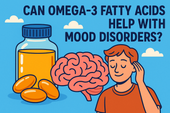
Can Omega-3 Fatty Acids Help with Mood Disorders?
Omega-3 fatty acids do more than support heart health — they can help balance mood, reduce depression, and calm anxiety. Discover how EPA and DHA nourish your brain, fight inflammation, and support emotional well-being from within. 🌊🧠
-

Vitamin D and Mood: The Sunshine Vitamin for Emotional Balance
Could the key to emotional balance be as simple as a little sunlight? Discover how vitamin D — the sunshine vitamin — influences serotonin, reduces inflammation, and helps you feel more positive and resilient year-round. ☀️💛
-

The Role of Magnesium in Reducing Irritability and Low Mood
Feeling on edge or emotionally drained? Magnesium could be the missing link between your body and your mood. Discover how this essential mineral reduces irritability, balances neurotransmitters, and helps your nervous system find calm again. 🌿✨
-
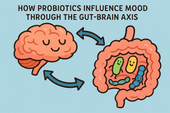
How Probiotics Influence Mood Through the Gut-Brain Axis
Discover how probiotics can do more than support your digestion—they can actually uplift your mood. This article explores the fascinating gut-brain axis and how balancing your gut bacteria through probiotics may help reduce anxiety, improve emotional stability, and support long-term mental well-being. 🌿🧠
-
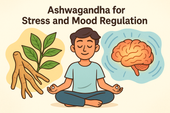
Ashwagandha for Stress and Mood Regulation
Discover how Ashwagandha, the powerful adaptogenic herb 🌿, helps your body manage stress and regulate mood. Learn how it balances cortisol, boosts GABA and serotonin, and supports emotional stability — helping you feel calm, focused, and resilient every day.
-
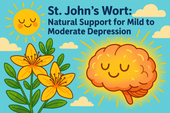
St. John’s Wort: Natural Support for Mild to Moderate Depression
Discover how St. John’s Wort, the “sunshine herb” 🌼, naturally supports mild to moderate depression. Learn how it boosts serotonin, balances mood, and promotes emotional resilience — with research showing its effectiveness compares to antidepressants, but with fewer side effects.
-
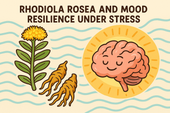
Rhodiola Rosea and Mood Resilience Under Stress
Discover how Rhodiola rosea helps your body adapt to stress 🌿. Learn how this powerful adaptogen balances cortisol, supports serotonin and dopamine, and strengthens emotional resilience — helping you stay calm, focused, and energized under pressure.
-

Chamomile and Lavender: Herbal Calm for Emotional Fluctuations
Discover how chamomile and lavender bring calm to emotional ups and downs 🌿. Learn how these two soothing herbs balance your nervous system, ease anxiety, and support restful sleep — naturally helping you find peace and emotional stability.
-
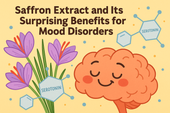
Saffron Extract and Its Surprising Benefits for Mood Disorders
Discover how saffron extract — the golden spice of joy 🌸 — can naturally support mood balance, ease anxiety, and lift mild depression. Learn what science says about its serotonin-boosting power, the ideal dosage, and how this ancient remedy compares to modern antidepressants.
-
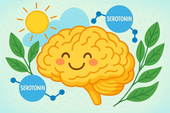
5-HTP and Serotonin: A Natural Path to Lifting Mood
Discover how 5-HTP naturally boosts serotonin 🌞 — the neurotransmitter behind mood, sleep, and emotional balance. Learn how this plant-derived compound supports happiness, reduces anxiety, and improves rest by helping your brain create more serotonin the gentle, natural way.
-
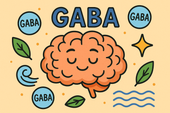
GABA Supplements for Reducing Anxiety and Mood Swings
Discover how GABA supplements can help reduce anxiety and balance mood naturally 🌿. Learn how this calming neurotransmitter works to quiet the mind, ease stress, and improve sleep — plus which nutrients and habits can boost your body’s own GABA production for long-term emotional stability.
-
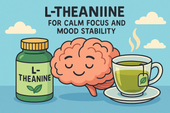
L-Theanine for Calm Focus and Mood Stability
Discover how L-theanine, the calming compound found in green tea 🍵, promotes focus, relaxation, and mood stability. Learn the science behind how it balances neurotransmitters, reduces stress hormones, and enhances clarity — helping you stay centered, calm, and productive without sedation.
-
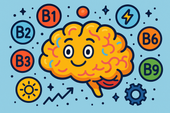
B Vitamins and Brain Chemistry: Supporting Energy and Emotional Balance
Discover how B vitamins power your brain chemistry ⚡. Learn how B6, B9, and B12 support serotonin, dopamine, and energy production — helping boost focus, mood, and emotional balance. From diet to supplements, explore how this vital nutrient group keeps your mind resilient and your energy steady.
-

N-Acetyl Cysteine (NAC) and Mood Disorders: What the Research Says
Learn how N-Acetyl Cysteine (NAC) supports brain health and mood balance 🧠. Discover how this antioxidant helps reduce oxidative stress, regulate glutamate, and improve emotional stability in depression, bipolar disorder, and anxiety — backed by cutting-edge psychiatric research.
-

Supplements for Bipolar Disorder: What May Support Stability
Discover the best supplements for bipolar disorder 🌿 that may support emotional stability and brain health. Learn how nutrients like omega-3s, magnesium, vitamin D, and NAC can help reduce inflammation, balance neurotransmitters, and complement traditional treatment safely.

















































